<< Previous | Displaying results 5241-5250 of 6772 for "" | Next >>
Aron was born to a middle-class Jewish family in Slonim, a part of Poland between the two world wars. His parents owned a clothing store. After studying in a technical school, Aron worked as a motion-picture projectionist in a small town near Slonim. The Soviet army took over Slonim in September 1939. War broke out between Germany and the Soviet Union in June 1941. Aron returned to Slonim. The Germans soon occupied Slonim, and later forced the Jews into a ghetto.
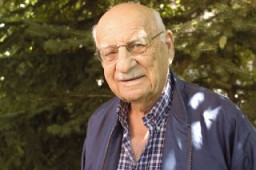
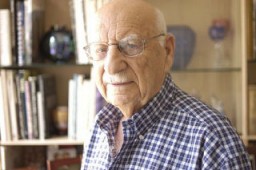
Thomas at age 13 months with his father, Mundek Buergenthal. Czechoslovakia, June 1935.
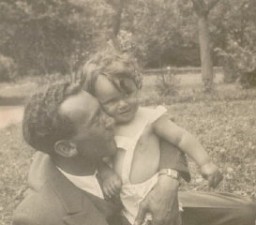
Thomas Buergenthal's parents, Mundek and Gerda (b. 1912). Czechoslovakia, 1933 or 1934. With the end of World War II and collapse of the Nazi regime, survivors of the Holocaust faced the daunting task of rebuilding their lives. With little in the way of financial resources and few, if any, surviving family members, most eventually emigrated from Europe to start their lives again. Between 1945 and 1952, more than 80,000 Holocaust survivors immigrated to the United States. Thomas was one of them.
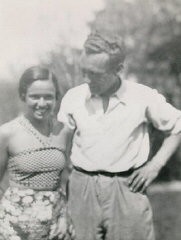
Three-year-old Thomas Buergenthal during a stay at a hotel in Czechoslovakia, 1937. With the end of World War II and collapse of the Nazi regime, survivors of the Holocaust faced the daunting task of rebuilding their lives. With little in the way of financial resources and few, if any, surviving family members, most eventually emigrated from Europe to start their lives again. Between 1945 and 1952, more than 80,000 Holocaust survivors immigrated to the United States. Thomas was one of them.
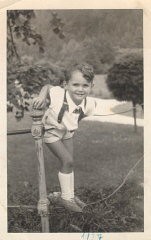
Three-year-old Thomas Buergenthal with his parents, Mundek and Gerda. Czechoslovakia, June 1937. With the end of World War II and collapse of the Nazi regime, survivors of the Holocaust faced the daunting task of rebuilding their lives. With little in the way of financial resources and few, if any, surviving family members, most eventually emigrated from Europe to start their lives again. Between 1945 and 1952, more than 80,000 Holocaust survivors immigrated to the United States. Thomas was one of them.
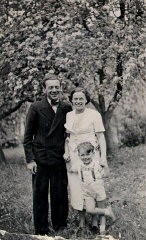
Photograph of a young Thomas Buergenthal posing in his toy car as his mother sits alongside. 1936.
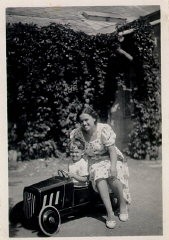
Thomas (left), 6 months after liberation, with a soldier who realized that Thomas was Jewish and took him to an orphanage, ca. 1945. Thomas was eventually reunited with his mother. With the end of World War II and collapse of the Nazi regime, survivors of the Holocaust faced the daunting task of rebuilding their lives. With little in the way of financial resources and few, if any, surviving family members, most eventually emigrated from Europe to start their lives again. Between 1945 and 1952, more than…
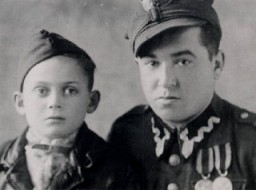
Thomas Buergenthal with his mother, Gerda, in Goettingen, Germany, 1950. With the end of World War II and collapse of the Nazi regime, survivors of the Holocaust faced the daunting task of rebuilding their lives. With little in the way of financial resources and few, if any, surviving family members, most eventually emigrated from Europe to start their lives again. Between 1945 and 1952, more than 80,000 Holocaust survivors immigrated to the United States. Thomas was one of them.
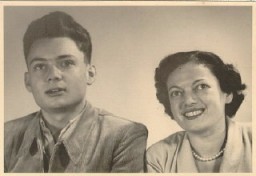
Thomas Buergenthal with his mother, Gerda, before Thomas's departure for the United States. Bad Neuheim, Germany, summer 1951. With the end of World War II and collapse of the Nazi regime, survivors of the Holocaust faced the daunting task of rebuilding their lives. With little in the way of financial resources and few, if any, surviving family members, most eventually emigrated from Europe to start their lives again. Between 1945 and 1952, more than 80,000 Holocaust survivors immigrated to the United…
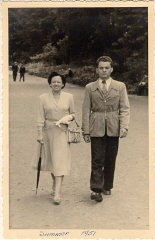
We would like to thank Crown Family Philanthropies, Abe and Ida Cooper Foundation, the Claims Conference, EVZ, and BMF for supporting the ongoing work to create content and resources for the Holocaust Encyclopedia. View the list of donor acknowledgement.